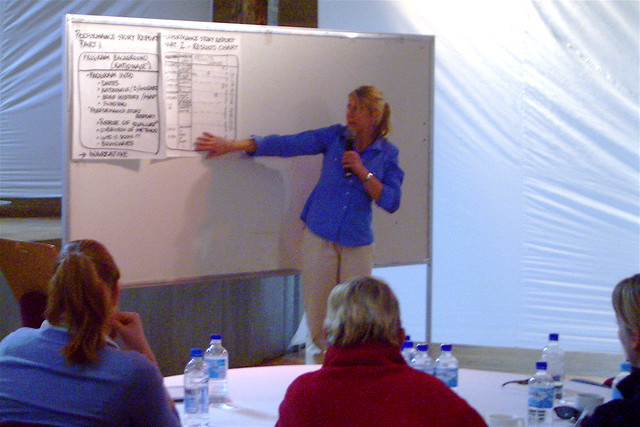 Good facilitation is essential to effective face-to-face KM processes. Effectively identifying and exchanging knowledge in a meeting requires high quality interactions between people. These interactions need to be built on
Good facilitation is essential to effective face-to-face KM processes. Effectively identifying and exchanging knowledge in a meeting requires high quality interactions between people. These interactions need to be built on- Open behaviours – listening, exploring, not criticising
- Good listening
- Dialogue, not argument
This requires balanced input from many people; not a few people talking, and the others listening. It requires process to be followed, within a given time frame. Without a facilitator, none of these are easy to achieve, particularly when you want to acheive the high-quality dialogue that is the basis of knowledge sharing!
Facilitation is the process making it easier for a group to effectively deliver the objectives of a meeting such as a Retrospect, a Peer Assist, or a Knowledge Café. By providing non-directive leadership, the facilitator helps the group negotiate the meeting processes, so that the group arrives at the required objectives. Their role is one of assistance and guidance, not control. The facilitator looks after the process of the meeting, while the group looks after the content of the meeting
Facilitation is not
- Teaching You are not teaching the group about Retropects or AARs, you are helping them to deliver results from a Retrospect or AAR
- Coaching You do not coach them towards the right answer – you don’t know the right answer – they do!
- Reviewing and assessing You will not tell them at the end whether they conducted the meeting correctly or incorrectly – you make sure they do it correctly!
- Team leadership The team leader is always interested in the outcome, and cannot facilitate effectively
- Identifying themes or common threads in a discussion “Many of us have identified planning as a problem in this project – I wonder if we need to have a short discussion on planning“
- Clarifying confusing statements , or ask for more detail on lessons “Susie, you said that it was important to plan properly – can you tell us what proper planning would look like?”
- Summarizing and organizing the ideas “If I can just summarize our discussion, we would suggest that in future , projects approach planning by ……….”
- Testing for agreement “Is that a fair summary of the discussion? What do you think?”




5 comments:
Why?
Why must people behave good when there is someone facilitating? Can't they just behave good enough without someone else? What is the hidden logic?
Because one's problem is easier to be identified by someone else (the facilitator)?
Hi Liu
the answer is that everyone comes to a meeting with their own agenda and their own preconceptions (and they are often unaware of this, by the way). Some want to talk, some want to defend a prior opinion, some want to avoid challenge, some want to challenge, and so on. The facilitator needs to ensure that the group, as a whole, delivers the requires result, rather than some individuals delivering their personal agenda. This is prarticularly true in those KM events which aim to produce value for others, such as Retrospects, where the facilitator needs to play a particularly active role.
Even where the meeting is designed to deliver value to the team, for example in a Peer Assist, everyone apart from the facilitator is primarily interested in the CONTENT of the meeting. The role of the facilitator is to manage the PROCESS of the meeting, and through good process to deliver good content.
I would add that the facilitator needs to establish psychological safety, which is embedded in the need for "open behaviors" you mention. Psychological safety is part of the larger organizational culture and can't necessarily be summoned at the beginning of the meeting if it's totally absent of the culture, but it can be strengthened one meeting at a time. (ref: Amy Edmondson, Teaming: How Organizations Learn, Innovate, and Compete in the Knowledge Economy, esp. chapter 4: Making it safe to team).
I know facilitation is inevitable, just want to know why. Psychological safety could be one of the reason, among others.
I am thinking about the role of police in the society, which is quite similar to that of a facilitator. The shared rules of the society will not be implemented well unless there is someone responsible for that.
And in any conflict treatment, the shared rules is the key. Once there is a shared rule, a group of people will be able to function well?
Certainly part of the role of the facilitator is to help the group to build "ground rules" for the event. If these are well-constructed, and constructed and "owned" by the people involved, then the facilitator's job will be much easier. However often the facilitator will need to monitor behaviour against those ground rules, and intervene if needed.
In a Retrospect, facilitation is a much more active process, and is closer to the role of a group interviewer.
Post a Comment